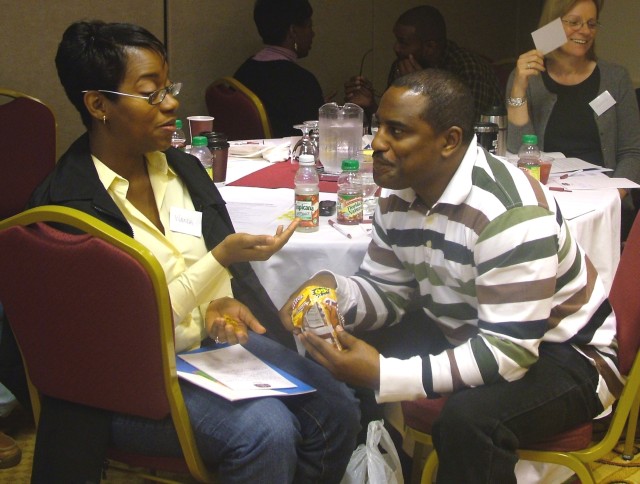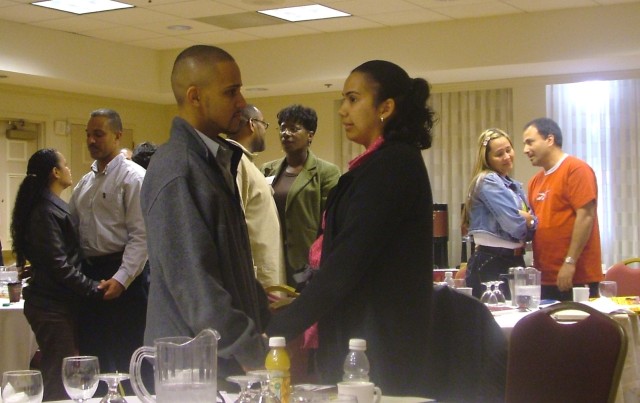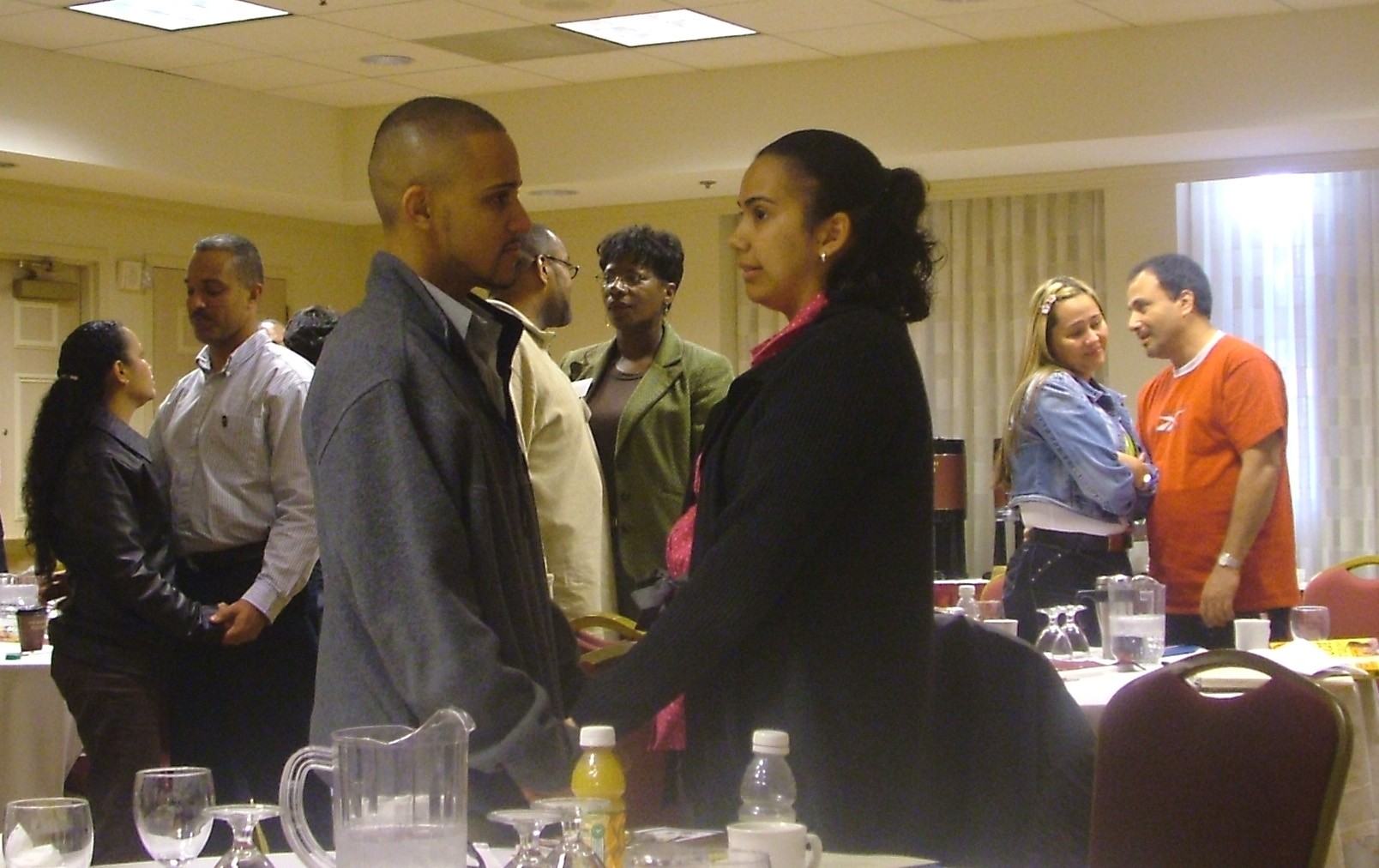WASHINGTON (Army News Service, Nov. 15, 2007) - Sgt. 1st Class Pernell Mabry's wife Wanda gave birth to twins the day before he deployed to Iraq. Like many other Soldiers, he missed their first Christmas and their first steps, and he didn't know if they would bond with him when he came home. The separation and reunion, he and his wife said, came with many challenges and unexpected adjustments.
The couple joined other Army Reserve couples - officer and noncommissioned officer, newlywed and those married 30 years - at a Strong Bonds weekend in Arlington, Va., Nov. 9-11, for a mini-vacation to strengthen their marriages. As the weekend progressed, most began to sit a little closer, share glances and hold hands.
The Strong Bonds program is a training program run by both active-duty and reserve-component chaplains. It originated in 1999 with the 25th Infantry Division, but has taken off during the war on terrorism, as Army couples needed to maintain or rebuild their friendships and intimacy amid repeated deployment cycles.
"We've seen the Strong Bonds program building strong Families," said Maj. Gen. Douglas L. Carver, the Army's chief of chaplains. "A strong Soldier, as he prepares or even goes to combat, will be strong if his Family's strong. It's based upon building strong communication, strong relationships, maintaining that strong intimacy that couples need to have."
"If for six months, you use the skills you learn this weekend, and it doesn't improve your marriage, call me and I'll take you out for a steak dinner, separately if necessary," Lt. Col. Mark Sachs, deputy staff chaplain for the 99th Regional Readiness Command, told the group. He added that he's facilitated 14 or 15 retreats and has yet to receive a phone call. He has, however, heard from couples who cancelled their appointments with divorce lawyers.
"The core of the program is communication styles, how to communicate well when it counts most, when you have something very sensitive to talk about or when the topic is risky or a high-emotional topic," said Chaplain Sachs. "We teach our participants about communication patterns that are toxic to a marriage, how to avoid them and what to do when you find yourself in one of those patterns. We talk about problem-solving or conflict-management, how to approach things that you differ on and come to conclusions, solutions, that are a productive way to represent what both husband and wife want.
"A lot of times when couples fight, it's because an event in the course of everyday life has sparked an issue for them. Couples tend to discuss the issue in the context of the event and because of that it never gets resolved. How do you separate issues from events and work through them in a way that's productive'"
The weekend includes a "date night," and couples must leave their home city and stay in a hotel in order to spend quality time together. The Army pays for everything, even the spouse's travel.
"This is critical because if your marriage isn't healthy, something's going to happen to you as a Soldier," said Lt. Col. Peter J. Frederich, Family ministries officer at the Office of the Chief of Chaplains. "We don't charge Soldiers to train on their weapon so we shouldn't charge them to train on their marriage."
Strong Bonds often includes some kind of recommitment ceremony, and Sgt. 1st Class Lorenzia Henderson, a chaplain's assistant with the 99th, urged Soldiers and their spouses to recognize each other. Tears fell on both sides as Soldiers thanked their spouses for holding everything together at home during deployments.
The 99th RRC added the Army's Battlemind training to the retreat, to ensure that the Soldiers, some of whom had recently returned from deployment, and their spouses knew the post-traumatic stress symptoms to expect, including isolation, aggression, drinking, flashbacks and nightmares.
"I think most of us got messed up down there and we don't see it until our wife says, 'I've got one foot out the door. Do you want to do something about it before the other one's out'' That's what my wife told me a couple of weeks ago," said one Soldier, emphasizing the importance of programs like Strong Bonds in helping marriages recover from or prepare for deployment.
Sgt. 1st Class Mabry, who returned from Iraq in September, said this retreat was the first opportunity he's had to spend time alone with his wife since his return. "I think this is really helpful and I thank the chaplain's section for coming up with the idea. Soldiers really need something to get them back into family-orientation, and this is really good. This is something that really helps."
"It's been very, very helpful to me; I think to both of us, because we've had our challenges since he's been back," added Mrs. Mabry. "With us having different parenting ideas and thoughts and opinions -- and for him, being a new parent all over again -- and then different backgrounds, I think this has helped us to have a common ground."
They both said they would recommend the program to other Soldiers and plan to use the techniques. In fact, 95 percent of couples say they would recommend the program on their after-action reports, said Chaplain Sachs.
According to Chaplain Frederich, Strong Bonds has been so successful that the National Institutes of Health gave the chaplaincy a grant for a five-year study to see if the program makes a difference in the amount of time the Soldiers stay in the Army, whether they get Post Traumatic Stress Disorder, what their promotion rates are, etc.
New versions of the program are now geared toward single Soldiers another involves entire Families. The one for single Soldiers focuses on how to choose the right partner, and the other version for Families focuses on parenting skills.
For more information or to find an upcoming retreat, visit <a href="http://www.strongbonds.org"target=_blank>
www.strongbonds.org</a>.




Social Sharing